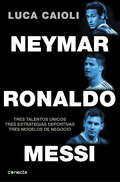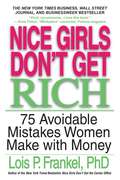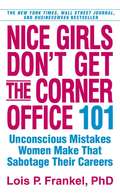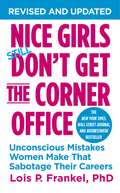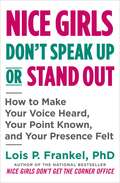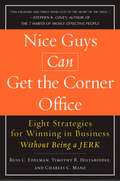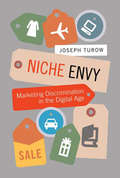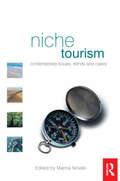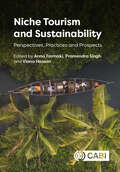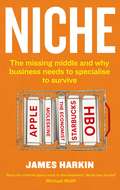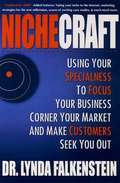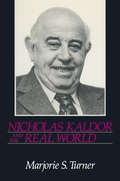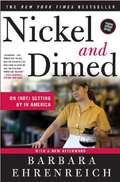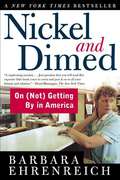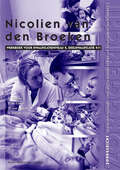- Table View
- List View
Neymar, Ronaldo, Messi: Tres talentos únicos. Tres estrategias deportivas. Tres modelos de negocio (Luca Caioli Ser.)
by Luca CaioliCómo se forman tres genios diferentes, y cómo se transforman en tres estrategias de juego y de negocio distintas. «Los tres son distintos. Los tres son jugadores a los que pasan el balón cuando el resto del equipo no sabe qué hacer, y ellos resuelven. Son futbolistas especiales. Lo único que tienen en común es el gol.»Vicente del Bosque Cuando observamos a los deportistas de élite, de la especialidad que sea, tendemos a pensar que su genialidad es innata, que nacieron con esa excepcional habilidad que hace de ellos seres extraordinarios. Y sin embargo, si los analizamos detenidamente, veremos que más allá del talento natural existe un contexto que ha hecho posible que este se desarrolle y alcance una expresión única. Neymar, Ronaldo, Messi describe el entorno social y familiar en el que se formaron los tres mejores futbolistas del mundo en la actualidad, y cómo esa etapa de formación ha dado lugar a tres estrategias de juego distintas, a tres carreras exitosas pero muy diferentes en la relación que establecen con sus compañeros y con sus entrenadores, para culminar en tres estilos y posicionamientos distintos en la gestión económica de sus carreras y de su imagen pública.
Nghe An Tate & Lyle Sugar Co. (Vietnam)
by Benjamin C. Esty Carrie Ferman Frank J. LysyIn September 1998, Paul Cooper, Tate & Lyle's finance director for international investments, asked the International Finance Corp. (IFC) to consider lending up to $45 million to finance a $90 million sugar mill in northern Vietnam. Ewen Cobban, an IFC agricultural specialist, was in charge of reviewing the proposal and making a loan recommendation to senior management. Cobban's main concerns were whether the plant was commercially viable and whether it had support from the government. He also feared that world sugar prices were falling and that sugar was a protected commodity. Before he could recommend approval, he had to determine whether they were temporary or permanent problems. Cobban also knew he would have to assess the project's developmental impact. The IFC only supported projects that contributed to sustainable development, and one of the key determinants of sustainability was the degree to which the project was "fair" to all parties involved. Thus, Cobban would need to assess not only the private returns, but also the social returns as measured by the project's economic rate of return (ERR). To do so, he would have to consider the various groups affected by the project and, where possible, quantify the impact on them.
Niccolò di Lorenzo della Magna and the Social World of Florentine Printing, ca. 1470–1493 (I Tatti studies in Italian renaissance history)
by Lorenz BöningerA new history of one of the foremost printers of the Renaissance explores how the Age of Print came to Italy. Lorenz Böninger offers a fresh history of the birth of print in Italy through the story of one of its most important figures, Niccolò di Lorenzo della Magna. After having worked for several years for a judicial court in Florence, Niccolò established his business there and published a number of influential books. Among these were Marsilio Ficino’s De christiana religione, Leon Battista Alberti’s De re aedificatoria, Cristoforo Landino’s commentaries on Dante’s Commedia, and Francesco Berlinghieri’s Septe giornate della geographia. Many of these books were printed in vernacular Italian. Despite his prominence, Niccolò has remained an enigma. A meticulous historical detective, Böninger pieces together the thorough portrait that scholars have been missing. In doing so, he illuminates not only Niccolò’s life but also the Italian printing revolution generally. Combining Renaissance studies’ traditional attention to bibliographic and textual concerns with a broader social and economic history of printing in Renaissance Italy, Böninger provides an unparalleled view of the business of printing in its earliest years. The story of Niccolò di Lorenzo furnishes a host of new insights into the legal issues that printers confronted, the working conditions in printshops, and the political forces that both encouraged and constrained the publication and dissemination of texts.
Nice Girls Don't Get Rich: 75 Avoidable Mistakes Women Make with Money (A\nice Girls Book Ser.)
by Lois P. FrankelBorrowing on your credit cards? Saving instead of investing? Caring for others financially and ignoring your own needs? The things you learned as a girl may be preventing you from becoming financially independent and following your own dreams. Now bestselling author Lois Frankel tackles the outdated concepts that keep you from having the wealth you deserve, and she offers tried-and-true coaching tips to help you take control of your money and your life. Discover all the "nice girl" behaviors-and how to overcome them today!
Nice Girls Don't Get The Corner Office: 101 Unconscious Mistakes Women Make That Sabotage Their Careers
by Lois P. FrankelThe things today's women learned as girls may be preventing them from becoming financially independent. Bestselling author Frankel tackles outdated concepts that women are continuing to follow and offers tried-and-true coaching tips to help them take control of their money and their lives.
Nice Girls Don't Get the Corner Office: Unconscious Mistakes Women Make That Sabotage Their Careers (A NICE GIRLS Book)
by Lois P. Frankel<p><i>The New York Times</i> bestseller, which for 10 years has been a must-have for women in business, is now completely revised and updated. In this new edition, internationally recognized executive coach Lois P. Frankel reveals a distinctive set of behaviors-over 130 in all-that women learn in girlhood that ultimately sabotage them as adults. She teaches you how to eliminate these unconscious mistakes that could be holding you back and offers invaluable coaching tips that can easily be incorporated into your social and business skills. The results for hundreds of thousands of women have been career opportunities they never thought possible-at every stage of their career, from entry-level to the corner office! Stop making "nice girl" errors that can become career pitfalls, such as: <p> <li>Mistake #13: Avoiding office politics. If you don't play the game, you can't possibly win. <li>Mistake #21: Multi-tasking. Just because you can do something, doesn't mean you should do it. <li>Mistake #54: Failure to negotiate. Don't equate negotiation with confrontation. <li>Mistake #70: Inappropriate use of social media. Once it's out there, it's hard to put the toothpaste back in the tube. <li>Mistake #82: Asking permission. Children, not adults, ask for approval. Be direct, be confident.</li> </p>
Nice Girls Don't Speak Up or Stand Out: How to Make Your Voice Heard, Your Point Known, and Your Presence Felt
by Lois P. FrankelDiscover the "must-listen for every smart, capable woman who wants to succeed"-a guide on how to communicate with maximum impact in the workplace that's the new book in the New York Times bestselling Nice Girls Don't series (Anne Fisher, Fortune.com). How many times have you asked yourself why you didn't speak up in a meeting? Or pushed for the raise you deserved? Or agreed to take on someone else's task because you didn't want to rock the boat? Whether the answer is once or ten times or more, the reason is the same: It's because you're a nice girl who goes along to get along. But staying quiet and being ignored are not paths to achievement.Now, in Nice Girls Don't Speak Up or Stand Out, Dr. Lois Frankel shows you how to be an effective communicator and advocate for yourself. From the basics of speaking up to navigating sticky situations and mastering the art of influencing others, this audiobook provides step-by-step advice using real-life examples and powerful tools such as:Be a broken recordChoose powerful wordNever say noEnlist advocatesAnd many more -- in bonus materials for extra tools in your pocketDr. Frankel chose the format of this new audio-first work carefully, with the mission of creating an interactive and impactful listen, interweaved with actionable recommendations, real-life anecdotes, and concrete examples of not only what to say in various scenarios, but how to say it. Nice Girls Don't Speak Up or Stand Out dives deeply into nearly one hundred everyday challenges women face related to communication.With Dr. Lois Frankel as your guide, you can learn how to express yourself confidently, courageously, and clearly -- and start taking charge of your career.
Nice Guys Can Get the Corner Office: Eight Strategies for Winning in Business Without Being a Jerk
by Charles C. Manz Timothy R. Hiltabiddle Russ C. EdelmanHow to succeed without being an SOB--or a pushoverMany people suffer from Nice Guy Syndrome, held back from higher levels of success by being too selfless at work. <P><P>It's a tricky problem, because if you start to think that being nice is bad, it's easy to overcompensate with selfishness, intimidation, and intense aggression. The founders of Nice Guy Strategies teach that nice is not about being weak or soft--that you can hang on to your morals, compassion, and sincerity and still get ahead. The key is to draw on eight practical strategies-- The Nice Guy Bill of Rights--that will help you find the right balance. Each chapter shares insights and stories from both ordinary nice guys and celebrity executives.
Nice Work If You Can Get It: Life and Labor in Precarious Times (NYU Series in Social & Cultural Analysis #8)
by Andrew Ross2009 Choice Outstanding Academic TitleA survey into an emerging pattern of labor instability and uneven global developmentIs job insecurity the new norm? With fewer and fewer people working in steady, long-term positions for one employer, has the dream of a secure job with full benefits and a decent salary become just that—a dream?In Nice Work If You Can Get It, Andrew Ross surveys the new topography of the global workplace and finds an emerging pattern of labor instability and uneven development on a massive scale. Combining detailed case studies with lucid analysis and graphic prose, he looks at what the new landscape of contingent employment means for workers across national, class, and racial lines—from the emerging “creative class” of high-wage professionals to the multitudes of temporary, migrant, or low-wage workers. Developing the idea of “precarious livelihoods” to describe this new world of work and life, Ross explores what it means in developed nations—comparing the creative industry policies of the United States, United Kingdom, and European Union, as well as developing countries—by examining the quickfire transformation of China’s labor market. He also responds to the challenge of sustainability, assessing the promise of “green jobs” through restorative alliances between labor advocates and environmentalists.Ross argues that regardless of one’s views on labor rights, globalization, and quality of life, this new precarious and “indefinite life,&” and the pitfalls and opportunities that accompany it is likely here to stay and must be addressed in a systematic way. A more equitable kind of knowledge society emerges in these pages—less skewed toward flexploitation and the speculative beneficiaries of intellectual property, and more in tune with ideals and practices that are fair, just, and renewable.
Niche Envy
by Joseph TurowWe have all been to Web sites that welcome us by name, offering us discounts, deals, or special access to content. For the most part, it feels good to be wanted--to be valued as a customer. But if we thought about it, we might realize that we've paid for this special status by turning over personal information to a company's database. And we might wonder whether other customers get the same deals we get, or something even better. We might even feel stirrings of resentment toward customers more valued than we are. In Niche Envy, Joseph Turow examines the emergence of databases as marketing tools and the implications this may have for media, advertising, and society. If the new goal of marketing is to customize commercial announcements according to a buyer's preferences and spending history--or even by race, gender, and political opinions--what does this mean for the twentieth-century tradition of equal access to product information, and how does it affect civic life? Turow shows that these marketing techniques are not wholly new; they have roots in direct marketing and product placement, widely used decades ago and recently revived and reimagined by advertisers as part of "customer relationship management" (known popularly as CRM). He traces the transformation of marketing techniques online, on television, and in retail stores. And he describes public reaction against database marketing--pop-up blockers, spam filters, commercial-skipping video recorders, and other ad-evasion methods. Polls show that the public is nervous about giving up personal data. Meanwhile, companies try to persuade the most desirable customers to trust them with their information in return for benefits. Niche Envytracks the marketing logic that got us to this uneasy impasse.
Niche Envy: Marketing Discrimination in the Digital Age (The\mit Press Ser.)
by Joseph TurowThe price we pay for the new strategies in database marketing that closely track desirable customers, offering them benefits in return for personal information.We have all been to Web sites that welcome us by name, offering us discounts, deals, or special access to content. For the most part, it feels good to be wanted—to be valued as a customer. But if we thought about it, we might realize that we've paid for this special status by turning over personal information to a company's database. And we might wonder whether other customers get the same deals we get, or something even better. We might even feel stirrings of resentment toward customers more valued than we are. In Niche Envy, Joseph Turow examines the emergence of databases as marketing tools and the implications this may have for media, advertising, and society. If the new goal of marketing is to customize commercial announcements according to a buyer's preferences and spending history—or even by race, gender, and political opinions—what does this mean for the twentieth-century tradition of equal access to product information, and how does it affect civic life? Turow shows that these marketing techniques are not wholly new; they have roots in direct marketing and product placement, widely used decades ago and recently revived and reimagined by advertisers as part of "customer relationship management" (known popularly as CRM). He traces the transformation of marketing techniques online, on television, and in retail stores. And he describes public reaction against database marketing—pop-up blockers, spam filters, commercial-skipping video recorders, and other ad-evasion methods. Polls show that the public is nervous about giving up personal data. Meanwhile, companies try to persuade the most desirable customers to trust them with their information in return for benefits. Niche Envy tracks the marketing logic that got us to this uneasy impasse.
Niche Tourism
by Marina NovelliNiche Tourism examines one of the fastest growing areas within the tourism sector. This book provides an integrated picture of speciality/niche tourism as a whole looking at both the 'macro' and 'micro' niche area. It has a comprehensive theoretical framework, and discusses initiatives, policies and strategies adopted internationally. With an emphasis on linking theory to practice, it is underpinned by up-to-date international case studies from around the world.Divided into 3 parts, it covers a variety of aspects under the headings of special interest tourism, tradition and culture base tourism and activity-based tourism.
Niche Tourism and Sustainability: Perspectives, Practices and Prospects
by Anna Farmaki, Pramendra Singh & Viana HassanNiche tourism, also known as special interest tourism, refers to specialized tourism products offered to a small group of tourists. Examples include ecotourism, rural tourism, birdwatching tourism, dark tourism and motorcycle tourism. Regarded as the antidote to mass tourism, niche tourism has become particularly popular in recent years as a tourism developmental option that can address the problems caused by mass tourism including overtourism. It is commonly acknowledged that niche tourism fosters responsible tourism practices, minimizes negative tourism impacts and helps preserve the environment and culture of destinations; thereby, promoting sustainability in tourism. Likewise, niche tourism seems to be better equipped to address the needs and preferences of today's sophisticated and diverse tourist market. Despite these advantages, niche tourism development faces challenges such as overlap with mass tourism due to growing numbers of visitors, promotion of products that are not environmentally friendly and limited economic benefits being directed to the local community. This book is a collection of 12 conceptual and empirical chapters presenting niche tourism cases from around the world. It examines tourist behaviour and experiences, resident perspectives, implementation practices and future prospects, and contributes to the debate on tourism development and sustainability.
Niche: The missing middle and why business needs to specialise to survive
by James HarkinAs high street and main street businesses continue to suffer, there's a new rule in business: forget about the general audience and instead stake out an identifiable niche.Woolworths suffered from a lack of identity and found that low quality and low price wasn't enough; General Motors crashed as motorists failed to distinguish between cars in their range. Yet HBO, Moleskine and specialist media like The Economist have all succeeded by building their authority over narrow areas of expertise and cultivating a passionate following - and their profits have mushroomed. Fascinating and thought-provoking, Niche is a superb examination of how innovation and profitability are moving to a series of tightly defined but globally scattered niches, bound together by the reach of the net.
Nichecraft: Using Your Specialness to Focus Your Business, Corner Your Market and Make Customers Seek You Out
by Lynda FalkensteinAuthor discusses how to develop a successful marketing niche for your business.
Nicholas Kaldor and the Real World
by Marjorie Shepherd TurnerFirst Published in 1994. Routledge is an imprint of Taylor & Francis, an Informa company.
Nicholas Kristof and Sheryl WuDunn: The Power of Writing to Launch and Sustain a Movement
by Michael Norris Julie Battilana Lakshmi RamarajanCase
Nick Fiore: Healer or Hitman? (A)
by Clayton M. Christensen Tara DonovanMany general managers face this predicament at one time or another: if I don't deliver the numbers, senior management won't invest in our growth. But what it takes to deliver the desired numbers may include layoffs and other undesirable solutions. Is it better to back off the short-term solutions and weather the revenue losses, or will cutting back in the short term actually help to deliver the long-term results? Looks at one general manager's struggle with these issues.
Nick Fiore: Healer or Hitman? (A)
by Clayton M. Christensen Tara DonovanMany general managers face this predicament at one time or another: if I don't deliver the numbers, senior management won't invest in our growth. But what it takes to deliver the desired numbers may include layoffs and other undesirable solutions. Is it better to back off the short-term solutions and weather the revenue losses, or will cutting back in the short term actually help to deliver the long-term results? Looks at one general manager's struggle with these issues.
Nickel and Dimed
by Barbara Ehrenreich Frances Fox PivenAcclaimed as an instant classic upon publication, "Nickel and Dimed" has sold more than 1. 5 million copies and become a staple of classroom reading. Chosen for "one book" initiatives across the country, it has fueled nationwide campaigns for a living wage. Funny, poignant, and passionate, this revelatory firsthand account of life in low-wage America--the story of Barbara Ehrenreich's attempts to eke out a living while working as a waitress, hotel maid, house cleaner, nursing-home aide, and Wal-Mart associate--has become an essential part of the nation's political discourse. Now, in a new afterword, Ehrenreich shows that the plight of the underpaid has in no way eased: with fewer jobs available, deteriorating work conditions, and no pay increase in sight, "Nickel and Dimed" is more relevant than ever.
Nickel and Dimed: On (Not) Getting By in America
by Barbara Ehrenreich Frances Fox PivenThe New York Times bestseller, and one of the most talked about books of the year, Nickel and Dimed has already become a classic of undercover reportage.<P><P> Millions of Americans work for poverty-level wages, and one day Barbara Ehrenreich decided to join them. She was inspired in part by the rhetoric surrounding welfare reform, which promised that any job equals a better life. But how can anyone survive, let alone prosper, on $6 to $7 an hour? To find out, Ehrenreich moved from Florida to Maine to Minnesota, taking the cheapest lodgings available and accepting work as a waitress, hotel maid, house cleaner, nursing-home aide, and Wal-Mart salesperson. She soon discovered that even the "lowliest" occupations require exhausting mental and physical efforts. And one job is not enough; you need at least two if you intend to live indoors.<P> Nickel and Dimed reveals low-wage America in all its tenacity, anxiety, and surprising generosity -- a land of Big Boxes, fast food, and a thousand desperate strategies for survival. Instantly acclaimed for its insight, humor, and passion, this book is changing the way America perceives its working poor.
Nicole M. Jones and The Hangar: Delta Air Lines' Global Innovation Center
by Linda A. Hill Emily TedardsIn 2016, Nicole M. Jones was hired to lead The Hangar, Delta Air Lines' new innovation center in Atlanta, Georgia. Delta's leadership had intended for The Hangar to catalyze a new approach to innovation at the company. After conducting three months of research on existing corporate innovation lab and accelerator models, Jones learned that most fail to scale impact across the core business. Drawing on her learnings, she established the values, strategy, and methodology for The Hangar to ensure just the opposite. Over the next three years, Jones and The Hangar's diverse team of design thinkers, technologists, and strategists brought together partners from Delta's core business and Atlanta's start-up and academic communities to execute a number of breakthrough innovations. After Delta's debut at the 2020 Consumer Electronics Show, Jones was invited to share her experience of setting up a corporate innovation lab with a consortium of innovation leaders. In preparation, she and her team are conducting a post-mortem of their three-year journey and reflecting on the lessons learned from one of their earliest projects-a Biometric Boarding Pass prototype they executed with CLEAR, a biometrics identity start-up.
Nicolien van den Broeken
by Nicolien Van Halem A. Gelton T. Terink P. De GrootZorgsetting: Kinderen en jeugdigen Setting: KraamafdelingKorte inhoud: Nicolien van den Broeken is verpleegkundige en werkzaam op de kinderafdeling van een algemeen ziekenhuis. Op deze afdeling krijgt zij te maken met kinderen met zeer verschillende zorgbehoeften. Dit heeft te maken met de verschillende ontwikkelingsfasen waarin deze kinderen zich bevinden en de diversiteit van opnames op een kinderafdeling. Zo heeft Nicolien te maken met chronisch zieke kinderen, kinderen met een levensbedreigende aandoening, met psychosomatische problematiek en met acute en geplande opnames. Bovendien spelen ouders een belangrijke rol op een kinderafdeling. Zij participeren in de zorg voor hun kind en kunnen 24 uur per dag aanwezig zijn. Dit betekent voor de verpleegkundige dat zij naast de zorg voor het kind, een taak heeft in de begeleiding van de ouders.
Nie wieder Stapel!: In fünf einfachen Schritten zum perfekt organisierten Schreibtisch!
by Nicole SehlDie meisten Büroprobleme haben direkt oder indirekt mit Stapeln zu tun. Schon bei der morgendlichen Ankunft am Arbeitsplatz vertreibt ihr Anblick die Lust auf den Tag. Während des Tages kämpft man mit ihnen um die Herrschaft über die Tischoberfläche und auf dem Weg nach Hause winken sie einem dann auch noch fröhlich hinterher. Nachts stören Erinnerungen und die daraus entstehenden Unsicherheiten den notwendigen Schlaf und so manch harmonisches Teamgefüge überlebt die von Stapeln verursachten Suchzeiten nicht. In fünf Schritten zu 100 Prozent Transparenz am Arbeitsplatz: Jedes Blatt Papier wird sofort dorthin befördert, wo es hingehört und wieder gefunden wird. Logisch, systematisch, strukturiert und sehr einfach. Ist das System einmal eingeführt, kann sich der Schreibtischnutzer, ob beruflich oder privat, endlich auf die eigentliche Tätigkeit konzentrieren. Urlaubs- oder Krankheits-Vertretungen sind durch die identische Organisation aller Arbeitsplätze ebenfalls leicht und unkompliziert möglich. Dieses Buch ist keine weitere Sammlung von 395 Möglichkeiten zur Vereinfachung des Lebens und die häufig gestellte Forderung nach Selbstdisziplin ist bei dieser Methode auch kein Thema. Es geht weder um innere Schweinehunde, noch um ein Anpassen der eigenen Persönlichkeit. Das Buch bietet konkret und realistisch eine runde Methode, ein in sich geschlossenes System, eben ein Werkzeug, mit dem Ordnung geschaffen und erhalten werden kann. Die Methode ist realistisch, langzeiterprobt, hocheffektiv und pragmatisch. Ein Anti-Stapel-Programm "made in germany". Die zahlreichen Beispiele und flott geschriebenen Anekdoten aus der Praxis machen das Buch zu einem kurzweiligen und leicht verständlichen Lesevergnügen. Die aktualisierte und überarbeitete 3. Auflage enthält u.a. mehr Informationen zu den Themen Nachhaltigkeit im Büro und Ordnung in den E-Mails. Eine umfangreiche Checklisten-Sammlung wird angeboten und ein zusätzliches Kapitel wird Angaben zu konkreten Ordnerinhalten, die jede Firma braucht, bieten (z. B. Personalakten oder Kundenakten).
Niedergetrampelt von Einhörnern: Die verheerenden Nebenwirkungen von Big Tech - ein Aufruf zum Handeln
by Maelle GavetDer technologische Fortschritt hat nahezu auf alle Bereiche positive Auswirkungen: auf unsere Art zu leben, zu arbeiten und unsere Freizeit zu verbringen. Und doch haben digitale Technologien auch die Büchse der Pandora geöffnet - mit verheerenden Nebenwirkungen: Desinformation, Hass und Mobbing, katastrophale Verletzungen der Privatsphäre, durch die "Gig economy" entfesselte disruptive Zerstörungen, monopolistische Repressionen und mehr. Tech-Giganten wie Facebook, Apple, Google, Amazon, Alibaba, Uber, YouTube, Twitter, Airbnb und eine Handvoll anderer Einhörner stehen an einem Scheideweg. Übernehmen sie weiterhin keine moralische Verantwortung im unerbittlichen Streben nach Größe? Oder wagen sie einen Neustart und stellen Ethik und Empathie in den Mittelpunkt ihres Handelns? COVID-19 dient als Brennglas für die Offenbarung des Besten und des Schlechtesten, was die Tech-Branche hervorbringt. Einerseits wäre das Leben definitiv viel mühsamer ohne Amazon, das uns das Nötigste direkt vor die Haustür legt, ohne Zoom und Skype, um mit unseren Kollegen und Familien zu sprechen, und ohne Netflix für das Streamen von Fernsehprogrammen und Filmen. Andererseits konnte sich innerhalb weniger Minuten eine Flut an Fehlinformationen und manchmal auch gefährlichen Lügen über das Virus per Twitter, Facebook, YouTube etc. rund um den Globus ausbreiten. Kein anderer Industriezweig hat jeden Aspekt unseres Lebens so schnell, tiefgreifend und umfassend verändert wie die Tech-Branche. Keine andere Industrie hat uns alle in einem solchen Ausmaß zu Opfern und Schurken gemacht. Keine andere Industrie hat neue Instrumente wie die KI entwickelt, die wir immer noch nicht zu kontrollieren wissen und die uns eines Tages vielleicht eher ersetzen als ergänzen werden. Es wird Zeit, dass wir alle genauer hinschauen, was die Einhörner (Tech-Konzerne mit einem Wert über 1 Milliarde US-Dollar) so treiben. Wie sie ihre Versprechen brechen, dem Wohle der Gesellschaft zu dienen. Wie Risikokapital dazu beiträgt, dass sie immer mehr zu marktbeherrschenden Monstern werden, die alles schlucken, was ihnen bedrohlich erscheint. Wenn wir nichts tun, um die Ambitionen der Tech-Riesen zu kontrollieren, könnte zur Realität werden, was in Orwells ?1984? und Huxleys "Schöne Neue Welt" als alptraumhafte Zukunftsvisionen beschrieben ist. Im schlimmsten Fall könnte auch eine Kombination der beiden eintreten: "Die Huxley-Dystopie treibt die Orwell-Dystopie an", sagte der Aktivist Aza Raskin in einem mit Gavet geführten Interview. "Die beiden sind konvergierend, wie zwei sich aufeinander zubewegende Wände." Dennoch - es liegt in der Macht unserer Gesellschaften, diese Situation zu ändern. Wir können etwas dafür tun, dass das vergangene Jahrzehnt eines Tages nicht mehr als Norm, sondern als Irrweg angesehen wird. "Niedergetrampelt von Einhörnern" ist ein erhellendes und aufrüttelndes Buch, das tiefe Einblicke hinter die Kulissen gewährt. Es ist die umfangreiche Enthüllung der Tech-Insiderin Maëlle Gavet, die sagt: "Wir brauchen nicht weniger Technologie, wir brauchen emphatischere Technologie." Sie beschreibt, wie die Tech-Branche diesen entscheidenden Wandel selbst vollziehen und Veränderungen vorantreiben kann, während Regierungen bereits aktiv an den Leitplanken dafür arbeiten.
